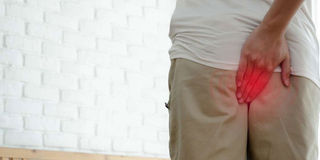I have an anal itch and don't know what to do

Haemorrhoids can be caused by straining when passing stool, e.g., due to constipation or diarrhoea. PHOTO | SHUTTERSTOCK.
Hello Dr Flo,
I have been having an itching kind of feeling around and inside my anus for quite a while. Recently, I realised I have a problem when trying to poop; it feels like something is growing inside my anus. It feels smooth, but it makes it hard to make a number two. When I go to relieve my bowels, there is bloody mucus but no bad smell and no pain. I’m anxious; what might be the problem?
Joshua
Dear Joshua,
You may have haemorrhoids (veins that bulge in the lower part of the rectum and anus). The walls of the veins stretch and get irritated and easily get a tear and bleed, especially when passing stool. The piles may be on the outside around the anal opening, or may “come out” when passing stool, and sometimes can be pushed back in. These are called external haemorrhoids. If there are far up inside that they cannot be seen or felt; they are called internal haemorrhoids. Symptoms include a painful or itchy swelling at the anal opening, and pain or bleeding when passing stool.
Haemorrhoids can be caused by straining when passing stool, e.g., due to constipation or diarrhoea. It can also be due to any activity that causes repeated high pressure in the abdominal region, e.g., a persistent cough and lifting weights. They are also more common in people who stand or sit for long periods and even during pregnancy. Most of the time, they resolve with diet and lifestyle changes, and with treatment, however, they can recur.
Itching around the anus can also be due to poor hygiene, skin tags, constipation, fungal infection, skin diseases like eczema or psoriasis, worm infection, sweating, and allergy/irritation caused by tissues, wipes, soaps or antiseptics.
It would be advisable to see a surgeon because of the bleeding and persistent itching. Some ointments and suppositories can help relieve the symptoms. Also, avoid scratching your anus, take lots of fluids and roughage to keep your stool soft, clean up with water and wipe gently after passing stool, schedule time each day for a bowel movement, and take your time.
Dear Dr Flo,
I need to know how I can get back my previous sex drive. I used to be able to go two to three rounds in one session with my wife, but lately, after only one round, I fall asleep. We have been married for 10 years now. I hope you will be able to help me, please. MD
Dear MD,
The average sexual response cycle has four stages — arousal/excitement, plateau, orgasm, and resolution. The intensity and time taken in each part will differ for each person, and even with every sexual encounter. During arousal, there is increased heart rate, breathing, muscle tension, and blood flow to the genitals. This leads to an erection for the man and can take a few minutes or even hours. In the plateau phase, these signs increase to the brink of an orgasm. The orgasm is the climax, and this is when ejaculation occurs. After the climax, the next phase is the resolution. During this stage, breathing and heart rate go back to normal, the muscles relax, and you lose the erection.
Men usually experience a refractory period — during this time, the body recovers, and you are unable to a climax again. This means that if you continue with sexual activity, it will take longer to ejaculate a second time than the first time. This period is different for each man, and it usually becomes longer as you grow older. For some people, the refractory period may even take days. Women do not have a refractory period and can experience multiple orgasms, one after the other.
It may be easier to delay ejaculation than to try to shorten the refractory period. Some of the ways to do this include:
1) Spend more time focusing on your partner.
2) Strengthen the pelvic muscles using Kegel’s exercises — tighten the muscles that you would use to stop urine flow. Contract these muscles 10 times and repeat at least three times a day.
3) Stop-start technique — during intercourse, when you feel the urge to ejaculate, stop all activity until the urge passes, then start again. By repeating the process as necessary and with practice, holding off ejaculation can become a habit.
4) Pause and squeeze technique — during intercourse, when you are about to ejaculate, have your partner squeeze the penis where the head joins the shaft for several seconds. Do this until the need passes, then continue.
5) Using a condom to reduce sensitivity.
6) Use topical numbing creams.
Dr Flo,
I recently took the emergency contraceptive pill, and I started bleeding on that day, and it has not stopped. What might be my problem? Atieno
Dear Atieno,
One of the side effects of the emergency contraceptive pill is that it can cause abnormal bleeding, that is, bleeding that is not your usual period. Another possibility is that you may have got pregnant, and the bleeding is a complication of the pregnancy.
A gynaecologist should review you, have some tests done to determine the best course of action. When hormonal medications cause abnormal bleeding, this may be allowed to resolve on its own if it is mild or may require treatment to stop the bleeding. If this happens severally, it may also be advisable to avoid using that specific contraceptive and choose a more reliable method that has fewer side effects for you.
Send your medical questions to [email protected] for free expert advice.


